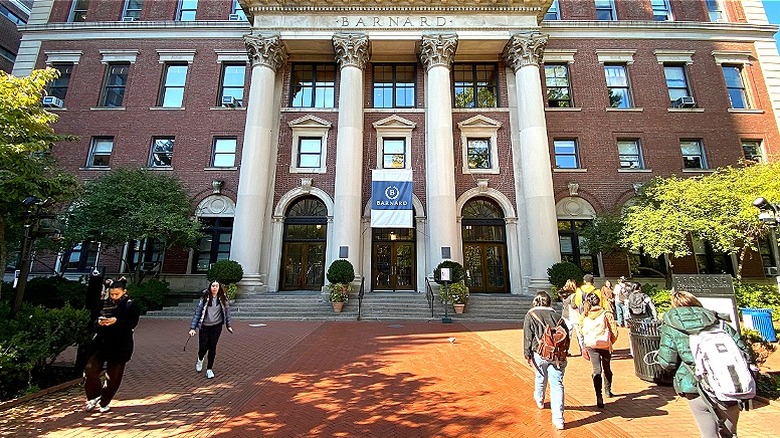The Alarming Reasons Young Adults Aren't Doing As Well As Their Parents Financially
When looking down through the generations it's easy to collapse problem areas into simple terms. While older Americans sometimes find themselves thinking their younger counterparts do too much complaining (at least, it's deployed as a common trope), younger people may sometimes view their elders as out of touch with reality (again with an oversimplification). Baby boomers own roughly $19 trillion in combined real estate assets, far and away the largest generational holding of wealth in the country. What's more, housing prices have skyrocketed, making some tasks that older Americans could accomplish readily (like finding a place to live) far more difficult for their younger cohorts.
Housing is an obvious culprit, but it's not the only factor at play. We spoke with Alaina Fingal, a certified money coach and owner of The Organized Money to discuss this financial disconnect. "A majority of the younger generation believe that they are in a worse position than their parents were at the same age," she told us. People in younger generations tend to "have higher income but are in more debt. Rising housing costs, food costs, and other living expenses are causing younger generations to live with their parents longer."
Taken together, there appears to be systematic failure-to-launch new adult independence at play — something that hasn't stymied the efforts of those who came before, at least not to the same extent. As we attempted to get to the bottom of this particular financial issue, here's what Alaina Fingal had to share, based on what she's seen with her own clients and through her research. (See why the great wealth transfer could prove disappointing for younger generations.)
Higher (and rising) education costs
The cost of education has exploded in recent years, with the price of tuition at some colleges hitting $100,000 a year. According to analysis from U.S. News & World Report, the in-state tuition costs for public universities (the least expensive higher-education option, typically) has risen 45% over the last two decades when accounting for inflation. Without taking inflation into account, the jump is 133%, and in both evaluation methods, in-state costs have risen by the greatest margin when compared to private and out-of-state educational expenses. Piling on, Alaina Fingal noted that "most young people will need to get higher education for the competitive job market," even though it's continuing to come at higher prices with each passing year.
Perhaps the real issue lying at the heart of rising tuition costs is a lack of equally expanding pay opportunities. Not only is company loyalty no longer a feature that's valued in the workplace, but wages have stagnated, showcasing a dramatic divorce from productivity increases starting in 1973 and actually declining by 5% among low-wage earners since around 1980. Add in the slashing of fringe benefits like health care coverage, pension plans, and other incentives (a red flag you should look out for in an employer), and the workplace is an inhospitable place to be for a young worker seeking to leverage their education and skills in a savage economy.
This growing disconnect makes young people in the U.S. second guess their decision to enroll in college altogether. But this is done at young people's own peril, since most higher-paying jobs today are locked behind an educational-attainment wall. Looking at data from the U.S. Bureau of Labor Statistics, earnings are around 79% higher for those with a bachelor's degree.
A prohibitive housing market
Housing is maybe the most obvious elephant in the room. According to Alaina Fingal, "purchasing homes has been a path to wealth in the past but most young millennials and Generation Z are unable to find affordable housing" today. Year-over-year growth puts home value increases at roughly 5.5% annualized since 1992, per CEIC Data. Compared to the lackluster job market that younger people are entering into, home value is quickly running away from buying power.
In another important metric, Visual Capitalist notes that the price-to-income ratio in 1985 was 3.5 (meaning 3.5 years of median earnings equaled the median home price); in 2024, the price to income ratio is at least 5.8 with some estimates placing it as high as 7.18. That's the highest it's been since charts began recording this data in 1947 and even surpasses the housing bubble in the mid 2000s. Plus, with increased interest rates acting as the norm, not only are younger buyers paying a severe premium for access to their own home, but they're also building equity slower than their parents.
The rental market doesn't offer much solace, either. The St. Louis Federal Reserve Bank reports that the consumer price index for rent in American cities also stands at its all-time high. An exponentially increasing curve here suggests that renters are simply doomed to continue experiencing this pressure indefinitely and in growing volume. Everywhere you look in the country, the cost to set off on your own is becoming prohibitive. This has led more younger people to live at home with their parents for longer — potentially stifling their individual growth. However, this is also an opportunity to possibly save for a home purchase with cost-free living in the short term, a silver lining to be sure.
Transportation as a necessary expense
Lastly, getting from place to place is also wildly expensive these days, as the public transportation system in the United States is woefully ill-equipped to provide for its user base. From generations of policy agendas that primarily benefit car-focused travel to a malaise in the perceptions of Americans in the value of a public-transportation network, underinvestment in this key component of city and national infrastructure has doomed present and future growth.
Said Alaina Fingal, both "transportation and car insurance are also one of the higher costs-of-living expenses but are often necessary to earn a decent wage." Unless you live in one of the few American cities that feature at least reasonable transportation — like New York, San Francisco, or Washington — you're almost certainly going to need your own car. Compound this with the reality that housing costs are so unaffordable everywhere that moving to a new city to chase a job (and then paying rent to live there) is off the table for many, transportation costs are simply baked into the formula as a personal vehicle and its associated operational costs.
This means paying for gas every few weeks, tacking on insurance costs, and potentially racking up additional costs in the form of auto financing to purchase a vehicle in the first place. Yet, Fingal aptly points to a major feature in the decision to buy a car. Even if a car is a stretch purchase for you, you'll still need your own set of wheels to reliably get to and from work in most parts of the country. This means taking on an extra expense just to have the option of bringing money in the door.



